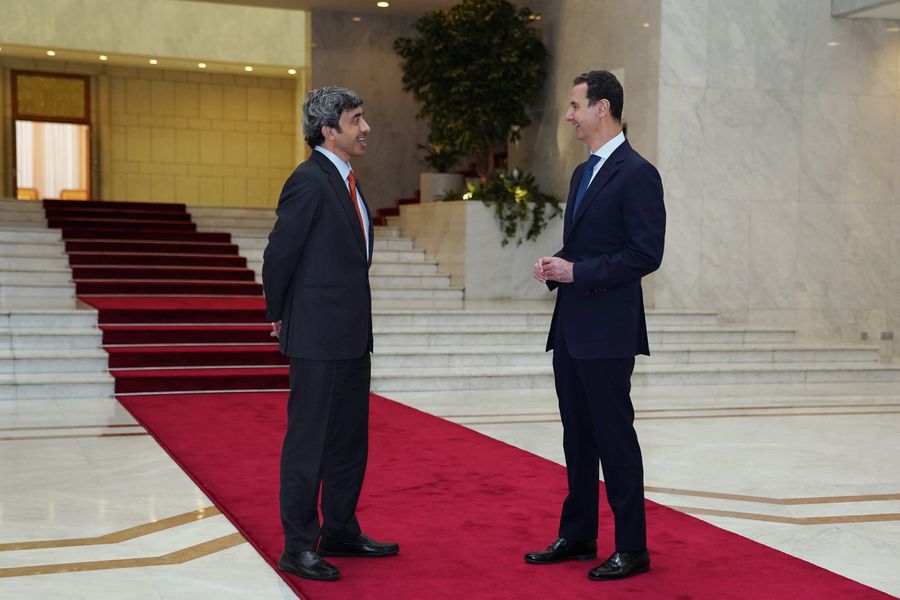The United Arab Emirates (UAE) has crowned its consistent efforts to normalize with Syrian President Bashar al-Assad with a non-surprise visit by Foreign Minister Sheikh Abdullah bin Zayed Al Nahyan. A presidency statement said Sheikh Abdullah led a delegation of senior Emirati officials that discussed bilateral relations and cooperation in a meeting with counterparts in Syria.
Albeit it was not a surprise, the visit stirred a storm of comments and criticism among international and local actors.
On Tuesday, the United States expressed its non-satisfaction with the visit, denouncing efforts to rehabilitate a “brutal dictator.”
“We are concerned about reports of this meeting and the signal that it sends,” State Department spokesman Ned Price told reporters.
“This administration will not express any support for efforts to normalise or rehabilitate Bashar al-Assad, who is a brutal dictator,” Price said, not referring to him as president.
Price said there was no question of legitimizing Assad.
“There has been no change in our position and Bashar al-Assad certainly has not said anything that would rehabilitate his image or that would suggest that he or his regime is changing its ways,” he said.
Opposition
The official opposition is yet to state its position on this move. The two major factions of the mainstream opposition – the Syrian National Coalition (SOC) and the National Coordination Commission (NCC) – are in Istanbul and it could have been an excellent opportunity to make a joint statement on the occasion.
On Tuesday, the leadership of the opposition Syrian National Coalition in Istanbul began meetings with a delegation from the National Coordination Committee to bring the views of the Syrian opposition closer together and “discuss the political process, evaluating it, and the options available.”
While the visit could have raised in the meetings, neither of the two delegations has mentioned that in public.
However, a senior source in SOC told The Observer that normalization in general and the top UAE diplomat visit to Assad in Syria were deeply discussed. The source expected an official statement to be published today (Thursday).
SANA
According to SANA, the participants discussed exploring “new horizons for this cooperation, especially in vital sectors to strengthen investment partnerships in these sectors,” the statement said.
They tackled the developments in the region and Arab world. They agreed to continue consultations and coordination over various affairs and challenges facing the Arab world to achieve the aspirations of their people away from any foreign meddling.
Assad underscored the “close fraternal relations” that bind the UAE and Syria. He hailed the stances taken by the UAE, which has always stood by the Syrian people.
Read Also: Assad Receives UAE Foreign Minister in Damascus
Sheikh Abdullah, for his part, stressed the support by the UAE of efforts aimed at achieving stability in Syria.
He said he had faith that Syria, through the leadership of Assad and efforts of its people, can overcome the challenges caused by the war.
Sheikh Abdullah is the most senior Emirati dignitary to visit Syria in the decade since the eruption of the country’s war.
Two possibilities
Former diplomat Bassam Barabandi told The Observer that two possibilities can explain the visit of Sheikh Ben Zayed to Syria’s Assad.
The first, according to the defected diplomat, is that Washington is lacking interest in the Syrian file in general. In light of its preparation for an upcoming summit with Moscow in Geneva to hold a strategic dialogue next week, which will focus on the humanitarian issue and keep the crossings for aid crossing open, one can explain the attitude of certain countries which are becoming more and more under the Iranian influence towards Syria.
This means, according to the Washington-based diplomat, that Washington is offering a step or an initial reward to Moscow by being silent on the Emirati openness to Damascus or indirectly encouraging it without adopting it.
In return, Barabandi adds, “the regime should take a step, with support or pressure from Moscow, regarding the new road map in Syria, based on the principle of Step by Step Strategy, which it hopes will see its fruits in its meeting with Moscow next week in Geneva.”
The second possibility, Barabandi explains, is complementary to the first. The visit came within the framework of coordination between Tel Aviv and the UAE to support the position of Moscow, which coordinates extensively with Tel Aviv to target Iranian sites in Syria, to gain Washington’s satisfaction concerning achieving progress in the nuclear agreement talks.
“Through this step, Tel Aviv desires to form a new alliance with Moscow to weaken the role of Iran and its proxies. This was clear when Israel targeted Iranian and pro-Iranian forces three times within a week in more than one place.”
Barabandi believes that the UAE wants to show itself as a useful player to the Americans after it had lost a lot of its status in Washington with this administration, and it is trying hard to tell Washington that it can provide its services even if it is immoral, such as normalization with Assad.
In the sense that this visit carries a certain symbolism, but we will not see its impact on the ground as long as Washington insists on not changing the status quo until a final ceasefire is reached in preparation for a new political settlement.
This article was translated and edited by The Syrian Observer. The Syrian Observer has not verified the content of this story. Responsibility for the information and views set out in this article lies entirely with the author.


